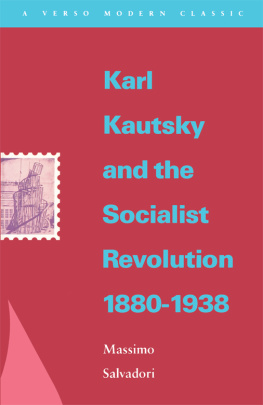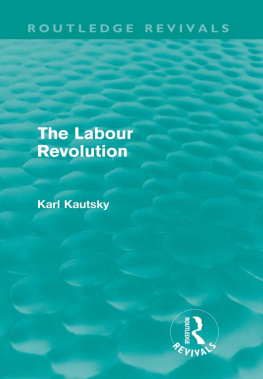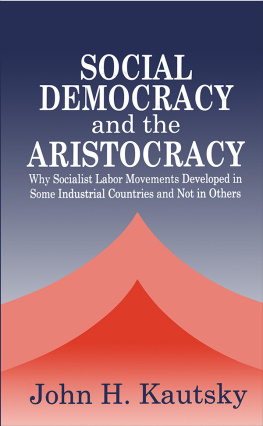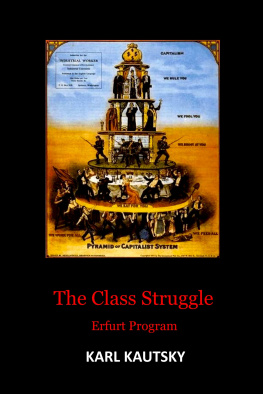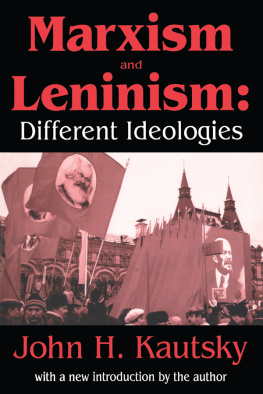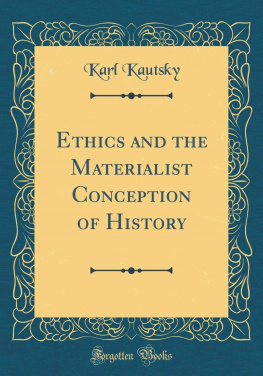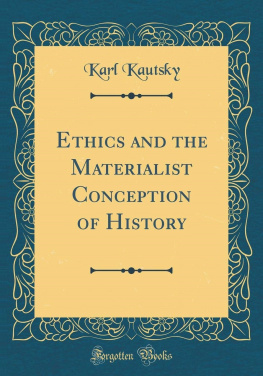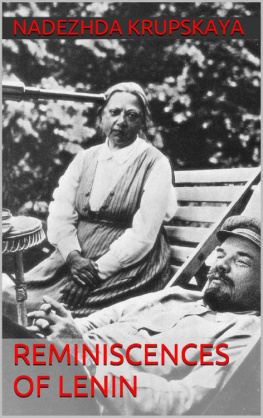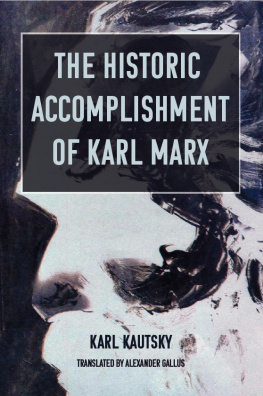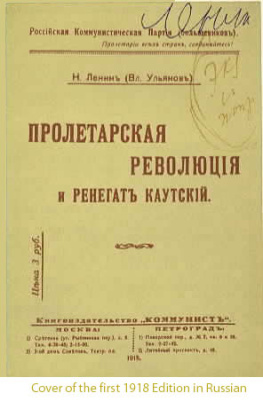Karl
Kautsky
and the
Socialist
Revolution
18801938

Titles in the
Verso Modern Classics
Series:
Karl Kautsky and the
Socialist Revolution
18801938
Massimo Salvadori
The Coming of the Book
The Impact of Printing 14501800
Lucien Febvre and
Henri-Jean Martin
Antonio Gramsci
Life of a Revolutionary
Giuseppe Fiori
For Marx
Louis Althusser
Translated by
Jon Rothschild | Karl
Kautsky
and the
Socialist
Revolution
18801938 |
Massimo
Salvadori |
 |
First published as Kautsky e la rivoluzione socialista 18801938 by
Giangiacomo Feltrinelli Editore, Milan 1976
First published in English 1979
This edition published by Verso 1990
Giangiacomo Feltrinelli Editore 1976
Translation New Left Books 1979
All rights reserved
Verso
UK: 6 Meard Street, London W1F 0EG
US: 20 Jay Street, Suite 1010, Brooklyn, NY 11201
www.versobooks.com
Verso is the imprint of New Left Books
ISBN-13: 978-0-86091-528-7 (PB)
ISBN-13: 978-1-78478-784-4 (US EBK)
ISBN-13: 978-1-78478-785-1 (UK EBK)
Typeset in Monophoto Ehrhardt by Servis Filmsetting Ltd
Printed in Great Britain by Biddies Ltd, Guildford
Contents
Karl Kautsky was one of the leading exponents of Marxism from the last decades of the 19th century to the early decades of the 20th. It has been universally recognized that he played a major role (for good or ill) in the history of German Social Democracy and the Second International. He was perhaps the supreme target of the polemics of Lenin (and Trotsky) in the controversy over the political and ideological significance of the Bolshevik Revolution and the Soviet state. Despite all this, Kautsky has been singularly ignored as an independent figure for historical study, unlike his peers in the history of Marxism and socialism. This does not mean that much has not been written about Kautsky. For the most part, however, he has been in effect assimilated into the history of the workers movement and treated in relation to other figures Eduard Bernstein, Rosa Luxemburg, Franz Mehring, or August Bebel, not to mention Lenin and Trotsky. These, unlike Kautsky, have themselves been the subjects of a considerable historiographic tradition. In sum, there is an enormous disproportion between the volume of references to Kautsky in the course of history itself and the paucity of critical studies devoted to him.
I have come to the conclusion that the main reason for this disproportion is that scholars have so far fundamentally confined themselves to the judgments for or against Kautsky that were pronounced in the thick of the political struggles between parties, ideologies, and movements in his own time. One might say that the image of Kautsky has remained fixed ever since in the forms it acquired in that epoch. A purely theoretical figure who lived a tranquil and anti-heroic, even a rather prosaic, life in an era of fire and steel, Kautsky has not proved an attractive subject for biography.
The general conception that long predominated, given the influence of Leninism and the judgment of Lenin himself, was that Kautsky was a Korsch maintained that Kautsky had never understood anything of Marxism, either before he became a renegade or after, and that he was always merely the exponent of a banal evolutionism, equally in his political theory and in his historical-philosophical outlook. The conclusions of the present work differ from both these views.
My interest in Kautsky goes back quite some years. I hope readers will pardon a brief explanation of it. My first contact with the veteran theorist dates from 1959, when his work The Agrarian Question (which, as we know, Lenin hailed enthusiastically when it originally appeared in 1899) was published in an Italian edition, with a long preface by Giuliano Procacci. This book made a deep impression on me. At the time, I was conditioned by the entire violent polemic of Lenin, leader of the Bolshevik Revolution and the Soviet State, against Kautsky the vulgar liberal who upheld a conception of the state and of democracy that never went beyond the platitudes of a dreary, philistine secondary-school teacher, a man who was thoroughly incapable of understanding the role of finance capitalism in the interpretation of imperialism, and so on. I was struck in particular by one fundamental question. How could Lenin have described Kautsky as a revolutionary up to the eve of the First World War if The Agrarian Question already evinced a conception of the state in full accordance with the positions Kautsky later defined in his polemic against Bolshevism, and in complete contradiction with the model of the Paris Commune?
Shortly after the appearance of the Italian edition of The Agrarian Question, Werner Blumenberg published Karl Kautsky Literarische Werk: Eine Bibliographische Uebersicht, My work does cover nearly all of Kautskys output, but from a specific angle. For the substantive focus of this book is an examination of the way Kautsky approached the relationship between socialism and democracy in the course of his long political activity. Indeed, the title easily could have been Democracy and Socialism in Kautsky. What I have sought to do is 1) to offer a concrete historical context for the analysis of Kautskys positions, viewing them through the prism of the history of the SPD and the German labour movement; 2) to examine to what extent and for what reasons Kautsky did or did not change his positions; 3) to draw some conclusions about the central problem raised by Lenin as to whether there was a real break in Kautskys evolution.
It may be useful here to give a brief preview of some of the conclusions I have reached on the third of these questions and to stress in what sense the work of Kautsky appears important and significant to me, beyond the specific role he played in his time.
As I point out in the course of this work, Kautskys evolution was indeed marked by a series of changes, even contradictions. Could it have been otherwise with a figure who grappled with social developments over a period lasting from the years immediately following the Paris Commune to the eve of the Second World War? Nonetheless, throughout his activity, or at least from the beginning of the 1890s to his death in 1938, Kautsky maintained a consistent conception of the modern state, of the role of parliament, of the function of the political and civil liberties bequeathed by bourgeois liberalism, of the indispensability of a centralized bureaucratic-administrative apparatus (in open polemic against the principle of direct legislation), and of the importance of political democracy as an instrument for assuring knowledge of society and ascertaining the will of its citizens. Kautskys point of view on all such problems remained remarkably constant. My answer to the question of whether Lenin was correct to call Kautsky a renegade because of his conception of the state and democracy is therefore clear: by the end of the 19th century, Kautsky held a view of them that would inevitably clash with Soviet theory and the practice of the government of the Bolsheviks. To be sure, Kautsky had spoken of socialist revolution and the dictatorship of the proletariat. Nonetheless, when Lenin and Trotsky accused Kautsky of having abandoned the perspective of the dictatorship of the proletariat which he had earlier long upheld, they were thoroughly mistaken, for they failed to note, or perhaps did not want to see, that Kautsky had always regarded the dictatorship of the proletariat as a regime which, although it would represent the power of the proletariat alone, would be established by free elections, would be committed to respect political and civil liberties, and would be based on the use of parliament for socialist purposes, and on constitutional control of a centralized administrative-bureaucratic apparatus of government. Undoubtedly, this was a standpoint in profound contradiction to the Marxist conception of the transitional state: on this point Lenin was correct. But it was nonetheless one that Kautsky had developed as far back as the turn of the century, and which he upheld constantly and openly even during the time when Lenin considered him a master of Marxism.

